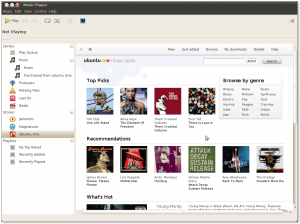 Last week, we reported on Canonical’s moves to incorporate a music store into Ubuntu. Ahead of Ubuntu’s April release of “Lucid Lynx”, Canonical have officially announced the public beta of their desktop music store.
Last week, we reported on Canonical’s moves to incorporate a music store into Ubuntu. Ahead of Ubuntu’s April release of “Lucid Lynx”, Canonical have officially announced the public beta of their desktop music store.
The key to the music store’s infrastructure is Canonical’s cloud storage solution, “Ubuntu One”. Purchased MP3’s are initially sent from 7digital to the user’s Ubuntu One storage account, which are then synchronised to the user’s PC. Purchased tracks are only permitted to be re-downloaded three times from 7digital. Although, having the tracks stored within the Ubuntu cloud makes this limitation practically irrelevant.
So far the Ubuntu One Music Store has been tied to Ubuntu’s default music player, Rhythmbox. Although, according to the music store’s FAQ it will become possible to use the store via other popular music players in the Linux world:
Q: What desktop application will include the Ubuntu One Music Store?
The standard Ubuntu music player, Rhythmbox, will be used for the music store. We know that people still want choice in their music player application so The Ubuntu One Music Store was developed as a plug-in that can be re-used in some other music applications. We have received approval from the music labels for the Ubuntu One Music Store to be embedded within Banshee, Amarok, and a few other applications. Please contact the Ubuntu One Music Store team for information about this process and implementation support.
Canonical’s sticking point at the moment is that the alpha testing population was relatively small, and they only have a month until Lucid is released. This leaves them in great need of a vast amount of feedback, in a short space of time. As such, they are calling for as many vocal beta testers as they can get. Advice on setting up the beta-version music store and giving feedback was posted by blogger, Popey.
There are some interesting cost implications here. In the short term, there are no official gratis downloads for beta testers. Although, 7digital always has a selection of free tracks, so people can test out the buying process without spending their own cash. In the long term though, Ubuntu One users are only given 2GB of storage for free. Considering that Ubuntu One is for storing anything that a user wants to keep in the cloud, they could soon run out of space. If so, they will find themselves having to buy more storage space, just so that they can buy more music! Time will tell whether users find this to be a cost-effective way of managing their data.
Finally, trust the record labels to come in and spoil the party; international restrictions will apply, just as with services like Spotify. The US, UK and Germany will get the best deals, having access to all four major labels and the independents.

This is great news. I wan't going to download the ubuntu beta, but this makes it more interesting. Question – Why MP3? I'd've expected ogg format.
I think it's the only format the 7Digital supports, they are the white label service that Ubuntu One Music Store is using.
I've got a few concerns about Ubuntu's new music store, which haven't really been allayed during my initial tests of the public beta. The main thing here is that it has got to just work, faultlessly. It's one thing having a few rough edges around otherwise perfectly useable software when it's a free download, quite another when money is involved. And that's the rub for me – Ubuntu's cloud service simply doesn't cut it as far as I'm concerned. To then tie the music store to said cloud service is very high risk. It's quite a cute move on Canonical's part – after all, 2GB of free storage will quickly run out if users make extensive use of the music downloads, but if it doesn't work consistently, I foresee major problems… Put it this way, having run Lucid over the last few weeks, nothing has persuaded me that Ubuntu One is stable enough to replace my cloud solution of choice – Dropbox. As for the music store – having made my purchase, it took ages for the music to sync up and appear in the music player, whereas with Amazon, using their Linux client, I can buy music, download it and have it playing within minutes – so much better.. and, it works across numerous Linux distributions, whereas Ubuntu One is tied to Ubuntu – and that kind of lock-in is what I was hoping to escape from when I ditched Windows 7 years ago…